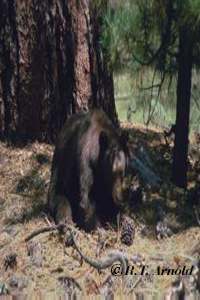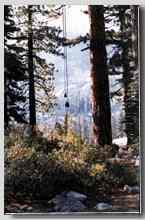
 This
site last updated 01.29 2016
This
site last updated 01.29 2016 |
|
|

Because
some bears, as a result of their interaction
with human kind, can become very skillful at finding and eating
human food. They may develop into "problem bears", as referred
to by authorities and lay people alike. Which often may lead to
punitive action by authorities including relocation & occasionally
and unfortunately the bears ultimate demise.
"A fed bear
is a dead bear".
Here is some basic information, on proper
back country bear (Make that human) etiquette.
|
|


R.T. Arnold
Having
Backpacked hundreds of trail miles in the Sierras, and large portions
of the Yosemite back country.
The
best information I have found, through my extensive research and
practical wilderness experience including several, face to face,
first hand encounters, suggests that most bears (Specifically
Black Bears) are mainly hungry opportunists, just looking for
a few "easy" calories to sustain them through their long winter
hibernation period.
Pay particular attention if you may be in an area
where Brown Bears or Polar Bears may be found, as
these species are known to present a higher risk of danger
to humans.
Remember that bears represent the top of the local
food chain, including HUMANS. It's their home; you're visiting.
I hope the following tips help you behave like a proper guest.
|

The best rule of thumb is
" KEEP YOUR DISTANCE"
and they will reciprocate.
Do's:
Proper food storage is essential.
- Do plan ahead obtain and carry "Bear Spray" learn the proper way to use it!
- Do read your wilderness permits
about local conditions.
- Do use only approved methods
of food storage.

- Do some homework on proper
food storage techniques. & buy or rent a bear
can if backpacking.
- Do store your garbage &
toilet items with your food in separate containers and use an
approved method of storage Ie. a bear can.
- Do use "bear boxes" in camp sites or
"cans" when in the backcountry or while camping in the widerness (Now required in Yosemite.)
or try the cables/poles available in the more popular wilderness camping sites.
- Do follow the written instructions
in your Wilderness Permit and information package for proper
storage techniques. When
obtaining your wilderness permits,
ask local authorities what the requirements are in the areas
you'll be seeing.
- Do speak to the local rangers
about bear activity in the area you plan to visit. These people
have the information you need, listen carefully and follow their
directions.
- Do where ever possible prepare
all meals well away from your camps sleeping area, at least
100 ft.
-
Do speak
to the local rangers first & where
permitted, carry pepper spray if they
advise you. Information on pepper
spray.
- Do learn how to proplerly use bear spray.
-
-
Short answer: No. There is no evidence to suggest that bears are attracted to menstruating women. Many moons ago, on August 13, 1967, two women were attacked in Glacier National Park by grizzlies and there was speculation about menstruation being the cause. Many subsequent studies confirmed that there is no link. Bottom line: Bears are much more attracted to the smell of your peanut butter and chicken a la king, than your period.
-
Don't try to
get a "closer look" by approaching a bear.
-
Never try to
corner a bear for any reason.
-
Never attempt
to feed a wild bear. (Or any wild animals). Remember a fed
bear is a dead bear!
-
Never leave your
food unattended or stored improperly, for even the briefest
of times, (i.e. your backpack or food sack).
-
Don't and don't leave
excess food in your vehicle. Prepare
any food, or leave any garbage or items with strong odors, (i.e.
toothpaste, deodorant, sunscreen, fishing tackle, bait etc.)
in or around your campsite.
-
Don't keep snacks
in your tent, even gum.
-
Wherever possible
particularly in Yosemite, use the food lockers provided &
never store food in your vehicle. If you must leave food
in your vehicle put it in the trunk or cover it. Generally out
of sight is out of mind. (Some areas even this won't be sufficient)
|
Do's:
Keep a cool head at all times
- If
there are 2 or more of you, stand close together to appear
more imposing.
- Make
loud noises, such as shouting "No Bear" or clanging Pots and Pans together.
- Keep
a good supply of rocks handy in camp.
(Near your tent door at night).
Don'ts:
-
Don't try to get a "closer look" by approaching a bear. Particularly
if attempting a photo opportunity.(Use
a zoom lens.)
-
Don't
turn your back or run. (You'll look like food)!
-
Never
try to recover your food from a bear once they have gotten
into it.
|
-
Stand your
ground some bears may try a "Bluff Charge".
-
If the
bear continues to approach this is a good time to throw
a good sized rock or stick toward the bear.
-
Lastly only as a last resort, stop
drop and cover your neck just like the civil defense drill
you learned in school.
-
Most of your
vitals are easier to get to from the front so stay on your
stomach. Roll back to your stomach if the bear turns you over
and lie flat. If you have a backpack on that can help protect
your vitals.
-
If the bear
persists, and only as a last resort, resist
with all your might. Try
to grab a stick or a rock, a knife or whatever you have, and
fight for your life. Your survival could depend on your fiercenes.
- How
to Escape From a Bear
- How to survive a black bear attack
|
|

FOOD STORAGE IN YOSEMITE N.P.
Bear Facts for Yosemite National Park
Please read this article
written by one of the world's formost authorities
on bear behavior.
Bear Hibernation
Bears average only 1 breath per minute with a heart rate of 8-10 beats per minute in hibernation.
|
Follow these
links to learn more
about bears & behavior.
|
|
|
Buy
this book @Amazon.com Synopsis:
Stephen Herrero is a leading
authority on bears and bear attacks.
I would recommend this book to
anyone seriously interested in bear behavior.
Synopsis:
Stephen Herrero is a leading
authority on bears and bear attacks.
I would recommend this book to
anyone seriously interested in bear behavior.
|
Buy
this book @Amazon.com Synopsis:This handy pack sized
book contains the essential tips. It's written for beginners
and experts as well.
Synopsis:This handy pack sized
book contains the essential tips. It's written for beginners
and experts as well.
|
Buy
this book @Amazon.com Synopsis:Offers detailed, comprehensive
& practical information on
how to travel and camp safely in bear country.
Synopsis:Offers detailed, comprehensive
& practical information on
how to travel and camp safely in bear country.
|
View some of my wilderness photos?
Send Your Questions
or Comments?
E-mail to:

Disclaimer
This
site is intended only as a general, common sense information resource.
We assume no responsibility for errors or omissions in this information.
3Bears.net assumes no responsibility for any injuries or property
damage resulting from any human-bear interactions.
 © ©
All rights reserved © 3Bears.net |
|






